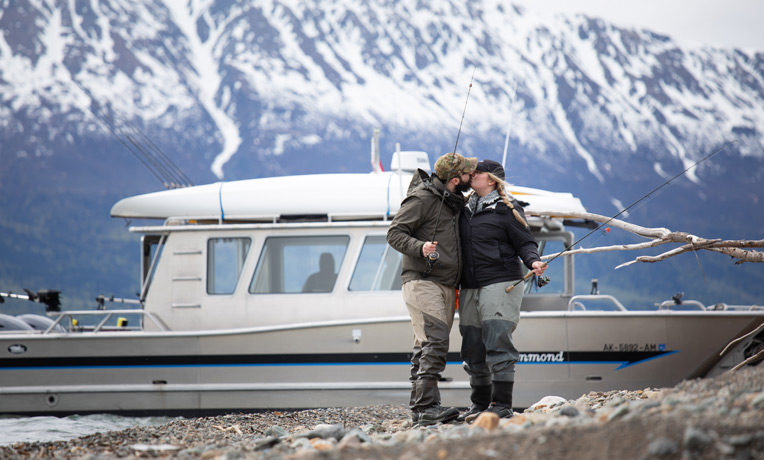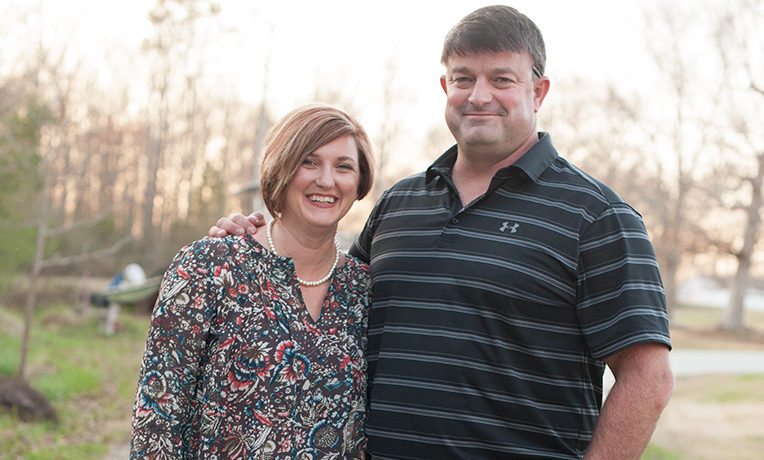Navy Corpsman Ward Taft found himself lost and disoriented eight years ago. He and his wife Amy slowly crawled out of that dark place and now help other military couples through Operation Heal Our Patriots.
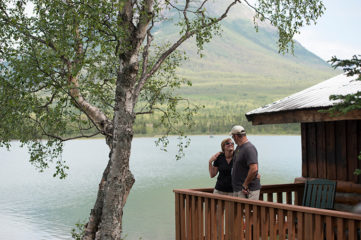
Ward and Amy share a moment during their week at Samaritan Lodge Alaska in 2014.
Ward Taft lived only a few familiar miles across flatland roads from Marine Corps Base Camp Lejeune, the undisputed toughest and largest employer in Jacksonville, North Carolina. He’d driven this route at least a thousand times to a job he’d loved for more than a decade.
He was an exceptionally skilled Navy medic who fought alongside the famed and highly-trained Marine Recon, a group of elite warriors executing special operations behind enemy lines. Ward was deployed to keep these teams alive, often under dismal conditions. If an AK-47 rifle round ripped through one of his guys deep in the Afghan mountains, he had to be prepared to perform surgery in a firefight.
And he carried more with him than medical skill. He was 6’2″ and built like a lineman. A great shot also skilled in high explosives, he was a tough guy in a tough-guy profession and had successfully found his way into and out of trouble in some of the world’s worst places.
But in 2009, only a few miles from home, he found himself helpless. He could hardly believe his own words to his wife on the phone: “I cannot get home. I don’t know how to get home.”
From Revved Up to Retired
There’d been signs his mind wasn’t quite right.
For example, if he stood on one leg he’d fall over. If he closed his eyes, he’d sway side to side and eventually topple.
But he couldn’t afford the luxury of complaining. He couldn’t let down his team, and the surges of adrenaline, inherent to the Marine Corps, seemed to cure most ailments. The adrenaline rushes were an unspoken job perk. They clouded fear, doubt, and worries about home and replaced all that with clarity, focus, and quick judgment under duress. But this hot burning fuel couldn’t change reality.
His brain had been damaged in the line of duty to his country.
“I’d been blown up several times,” Ward said. “I’d lost consciousness. Blacked out. Over years and years of that, it takes a toll.”
When he called his wife, lost in his own town, he knew this was something very different—like a whole swath of hardwired memory had been erased.
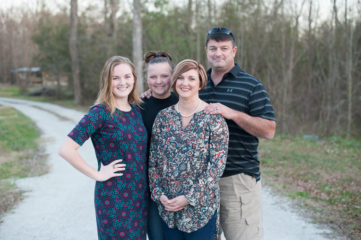
Ward, Amy, and their daughters live in Jacksonville, NC near Marine Base Camp Lejeune.
“I did a knucklehead thing today,” he told Amy. “I was driving home and I couldn’t find my way so I turned around, walked into the base, and told them I wasn’t going on deployment. And now I cannot get home. I don’t know how to get home.”
The Tafts weren’t surprised when neurologists discovered multiple concussions. MRIs also showed significant damage to Ward’s frontal lobe. The deployment he’d just spent a year preparing for, and the career he’d been building for more than a decade, were leaving him behind.
“I remember that as the year from Hades,” Amy said.
There’d be screaming and yelling followed by days when Ward refused to get out of bed. And Ward, a natural jokester, would fly off the handle and kick something or fling a backpack across the room. “The backpack wasn’t where it was supposed to be hung up,” Ward recounted. “I couldn’t handle it.”
Ward and Amy’s two daughters were often scared of their father, and Amy was just plain weary from how unpredictable her husband had become. The battle had come home and the Taft family was on the frontlines of a new war.
“I would have packed up and gone to live with my parents,” Amy said, “if I didn’t know they’d tell me to turn right back around and go home.”
‘Divorce Wasn’t an Option’
“For us, divorce wasn’t an option,” Ward said. “We took that off the table.”
But their marriage was no honeymoon either. They would tell you it still isn’t.
When you look at Ward you don’t see a wounded veteran. You see a sharp-looking family man. Dip deeper and you’ll find that while his Post-Traumatic Stress Disorder and Traumatic Brain Injury are invisible scars, they have serious consequences.
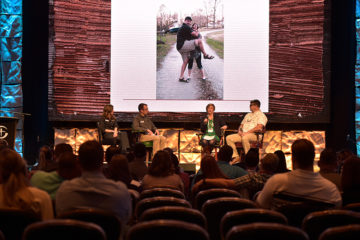
Ward Taft and wife Amy joined Aftercare chaplain Greg Duvall and his wife Shawna to lead a workshop at the 2017 Operation Heal Our Patriots Reunion in West Virginia.
Nonetheless, the Tafts’ commitment to marriage, to each other, and, most important, to God, bolstered them as they made space for this new reality. They both patiently learned the effects of Ward’s injuries and what triggered them. At times things got really bad. At times they still do.
“There are plenty of days I don’t feel like I should get out of bed,” Ward said. A frontal lobe injury means he can’t filter noises and other stimuli. His sunglasses, which he wears most of the time—even indoors, provide a therapeutic buffer between Ward and the world. And his large Labradoodle, Dr. Doolittle, provides a comfortable respite for difficult emotional responses. Sometimes during social events Ward will need to disappear, and Amy understands.
When the Tafts came to Alaska through Operation Heal Our Patriots in 2014, they were five years into this new journey. At Samaritan Lodge they came to see why God had crossed their paths with other hurting military couples.
They’d felt a pull toward Christian ministry but with Ward’s condition it seemed impossible. His struggles, though, are what paved the way for them to help others. The Camp Lejeune community is large but tight, and the needs they’ve discovered since their time in Alaska have unearthed a calling they had buried—to strengthen other couples in their community with troubles like theirs.
Struggle Becomes Opportunity for Service
Ward and Amy now serve as the primary contacts for our Aftercare program in Jacksonville. Local military couples, both those involved with Operation Heal Our Patriots and those not, regularly gather with them for fellowship and encouragement. The couple also recently helped lead a seminar at the 2017 Operation Heal Our Patriots Reunion in West Virginia.
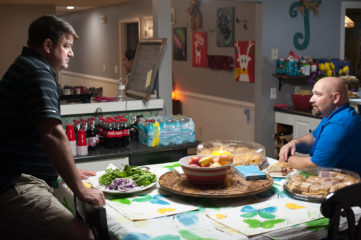
Ward meets with a retired Marine during a gathering hosted by the Tafts to minister to military couples at Camp Lejeune.
Though the Tafts are doing well, it’s still not easy, even now after eight years. “There are still days I’d like to strangle the ‘condition,'” Amy said. “I say ‘condition’ now instead of ‘Ward,’ but it’s taken me years to be able to say it that way and actually mean it.”
It’s that honesty and the grittiness of their fight that give them a platform when fellow military personnel come to them in marital crisis, as one Marine spouse did recently.
Her car was packed and running in the driveway. She was ready to leave but decided to call Amy, one of many such phone calls Ward and Amy have received over the years.
“I can’t do this anymore,” she told Amy.
“Go turn the car off and unpack,” Amy told her. “I promise you don’t want to do this.”
That couple is still together.
Ward and Amy say this ministry offers healing and meaning to their own experiences.
“Because we are able to help others, it gives meaning to why Ward was deployed, why he was injured, and to what we face as a family. None of this was in vain,” Amy said. “In fact, it’s the unique way God has called us to fulfill the Great Commission.”
